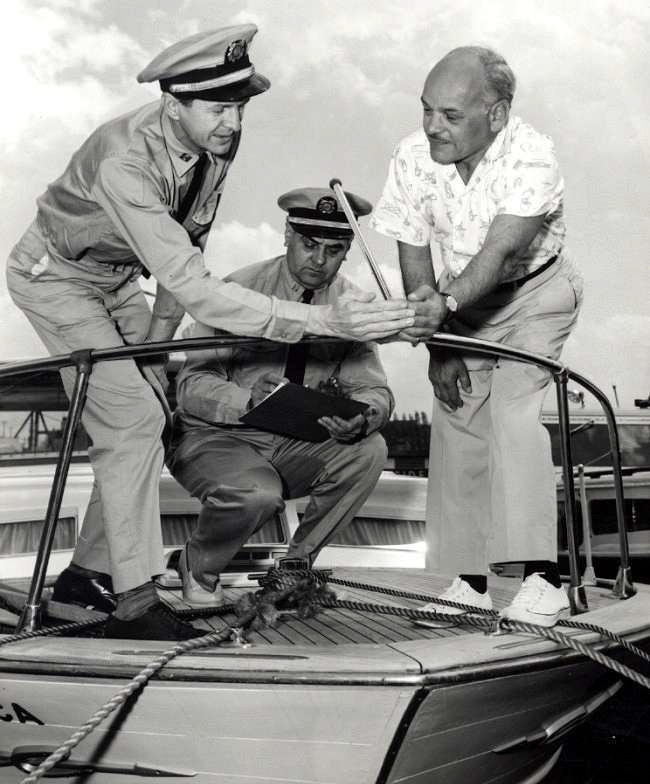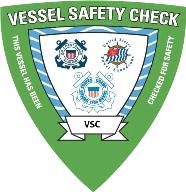Vessel Safety Checks
The Vessel Safety Check is a complimentary check of your boat conducted by members of the Auxiliary, confirming that it meets both federal and state requirements for safety.
No citations are issued and the results of the safety check are not reported to any enforcement agency, but a decal is awarded to display if the vessel has passed the examination.
The Vessel Safety Check gives you a risk-free way to check that you meet the legal minimums and to potentially avoid a citation later.
For more information on Vessel Safety Checks contact us by email with specific questions. If you don't live in the Cape Ann area, you can find a Vessel Examiner near you.
| Benefits of a Vessel Safety Check: | |
|
Boarding Anxiety: The Cause and Cure
by Ted Chatham, USCG Auxiliary Public Affairs Officer
Summertime: It’s a sunny afternoon in Boothbay Harbor or Wiscasset or Bath, a perfect day for an outing on the boat with the family. Approaching from your starboard side is an odd-looking silver boat with a bright orange collar running around the hull at the waterline; as it draws nearer the words “U.S. Coast Guard” and the flashing blue light come into focus. You’re about to be boarded and the list of items that may either not be on board or in good order flashes through your brain.
You are experiencing “Boarding Anxiety”, and the common symptoms include sweating, muttering and sudden, agitated thoughts such as:
“How old are my flares? Do I even have flares? Do I have a life jacket for everyone on board? Did I remember to get the annual registration done? Where’s the paperwork? Do I still have that blue throw-cushiony thing someplace?”
As the odd-looking boat with the flashing blue light pulls alongside with four or five very polite Coast Guard members on board, you’ll soon hear the words, “Good afternoon, we’d like to come aboard and conduct an inspection of your vessel.” And come aboard they will.
Unlike the restrictions under which law enforcement must operate on land in terms of a search of your vehicle during a traffic stop, the Coast Guard requires no “probable cause” to board, inspect or search your vessel. Once on board the boarding officer will go down a list of federally required items that must be on board and in good working order. The list consists of basic safety or environmentally related items and it’s not a long one. Registration, life jackets, flares, lights and a means to secure an onboard toilet from accidental overboard discharge are common items that may need attention.
While big fines are rare, you will be required to prove to the Coast Guard or a designated representative, such as a Coast Guard Auxiliary vessel examiner, within a specified time period that any issues have been resolved. In most cases there’s a quick fix, buy new flares, get a few more life jackets, etc. If the problem is non-working navigation lights or a dead bilge ventilation blower due to faulty wiring or a bad switch, the fix may be a lengthy one and put you at risk of exceeding the grace period for getting things resolved and rechecked without a fine.
The good news is that there’s an easy and free way to avoid “Boarding Anxiety”; a Vessel Safety Check or “VSC” from the U.S. Coast Guard Auxiliary. The CG Auxiliary checks the same items that the Coast Guard boarding team will check except what you’ll receive is a confidential report with a list of any items that need attention. After that it’s up to you to decide what you want to fix and what you may decide to risk putting off until later. If your boat passes, a “VSC” decal will be applied to indicate that everything is in compliance with federal and state requirements.
There’s no guarantee that you won’t be boarded again but at least you’ll be inoculated against Boarding Anxiety because you’ll know that everything is onboard, correct and in good shape.
Pass or fail no reports will be filed and the report form only has 2 copies, one for you and one for the examiner to keep if you’d like him to return to confirm that all the problems have been adequately addressed.
There are several ways to get a free Vessel Safety Check:
- scheduled events at local marinas and boat ramps;
- from anywhere in the United States go to cgaux.org/vsc;
- in the Cape Ann area contact CG Auxiliary Flotilla 46 at [email protected] or 1-844-GOCGAUX; or,
- contact the nearest Coast Guard station and tell them you’d like a Vessel Safety Check from the CG Auxiliary.
A few minutes now may save you anxiety, inconvenience and expense later, plus finding out that your lights are all out, the bilge blower isn’t working, or your fire extinguisher has lost its charge may save your family’s lives.

Unknown location / Date: The uniforms may have changed but the USCG Auxiliary still checks the bow light as part of a free Vessel Safety Check or VSC for recreational boaters. The VSC process includes every item that will be checked if boarded by the Coast Guard, no fines will be levied or reports filed; the inspection results are confidential and serve only to give the boater a list of any items that may need repair or replacement. (Photo: USCG Auxiliary archives.)
